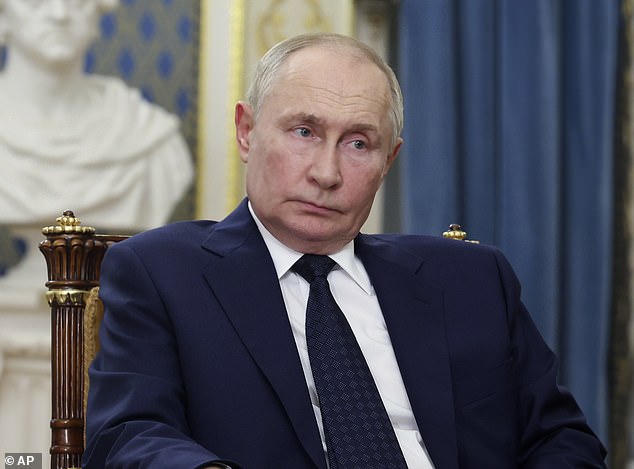Russia has handed over nuclear bomb secrets to Iran in exchange for missiles to bomb Ukraine, as fears grow in the West that the world could be on the brink of a third world war.
The plans were discussed during a meeting between US President Joe Biden and British Prime Minister Keir Starmer at the White House on Friday.
If confirmed, the deal would cause great concern as Tehran is advancing its uranium enrichment programme, a step towards developing a nuclear weapon.
British sources say alarm bells have been raised over Iran’s trade in nuclear technology, which is feared to be part of a deepening alliance between Tehran and Moscow.
Last week, the US and UK declassified crucial information revealing that Russian President Vladimir Putin had accepted a shipment of Fath-360 ballistic missiles from Iran’s Supreme Leader Ali Khamenei.
The West fears that tyrannical Russian President Vladimir Putin handed over nuclear weapons secrets to Iran in exchange for missiles to bomb Ukraine

The critical plans were discussed during a meeting between US President Joe Biden and British Prime Minister Keir Starmer at the White House on Friday.

Putin had accepted a shipment of Fath-360 ballistic missiles from Iran’s supreme leader Ali Khamenei (pictured)
Following the handover, US Secretary of State Anthony Blinken shared a chilling warning during a visit to London with his British counterpart, David Lammy.
“For its part, Russia is sharing the technology that Iran is seeking — it’s a two-way street, including on nuclear issues — as well as some space information,” Blinken said, suggesting that Russia and Iran are engaged in destabilizing activities with global implications.
As a result of the missile shipment, Iran Air has been banned from flying or landing in Britain and Russian shipping companies have been subject to sanctions for their role in transporting the weapons.
The White House summit hosted talks on the possibility of allowing Ukraine to use UK-made Storm Shadow missiles to bomb military targets on Russian soil, but no final decision has been announced.
No announcement on approval for the strikes is likely to be made until “the first missile lands,” a Western official told PBS on condition of anonymity.
Although Britain, France and Germany have warned that Tehran has increased its supply of uranium, it is unclear whether it has the capability to build a nuclear weapon.
However, working with experienced Russian specialists or using Russian intelligence would help speed up the manufacturing process; Iran has denied it is trying to build a nuclear bomb.
Since Russia’s large-scale invasion of Ukraine in February 2022, Russia’s relationship with Iran has deepened to an unprecedented level.
Their military collaboration has continued to grow at an alarming rate, with Iran becoming a vital member of Russia’s air and ground campaign in war-torn Ukraine.
Since the brutal invasion, Iran has supplied Moscow with Shahed drones, which have been used to bomb Ukrainian cities.

The White House summit hosted talks on the possibility of allowing Ukraine to use UK-made Storm Shadow missiles to bomb military targets on Russian soil.

Pictured: A Ghadr-H missile, center, a Sejjil solid-fuel surface-to-surface missile, and a portrait of Iran’s Supreme Leader Ayatollah Ali Khamenei.

Russia and Iran, while not historically an alliance, have become increasingly entrenched in their opposition to the West. Pictured: A Russian missile launch in the Arctic Ocean on September 12, 2024
In addition, Tehran is reported to have helped Russia set up a factory to produce more drones for use in the ongoing conflict.
Iran had reached a deal in 2015 to halt its nuclear weapons development in exchange for sanctions relief from the United States and other Western nations, but the agreement was scrapped in 2018 by former U.S. President Donald Trump.
Iran retaliated by violating agreed limits on the amount of enriched uranium it could stockpile.
Concerns about Iran’s possible development of nuclear weapons have been mounting for months and are now causing fears to escalate in the Middle East.
Iran’s support for militant groups such as Hamas and Hezbollah has made its nuclear activities a major concern for Israel, as the possibility of Iran obtaining a nuclear weapon is seen as a direct threat by Jerusalem.
This is because Tehran’s proxies in Lebanon and Gaza continue to repeatedly challenge the Israeli military.
In April this year, Iran launched a Russian-style missile and drone attack targeting Israel, though it was intercepted and stopped with the help of the US and UK.
Russia and Iran, although historically not an alliance, have increasingly reaffirmed their opposition to the West.
This has given rise to what some analysts have called an “axis of turmoil” that also includes China and North Korea, reflecting a return to an era of state competition reminiscent of the Cold War.
Following crucial talks on Friday, Starmer is due to travel to Italy tomorrow, where he is expected to discuss the use of Storm Shadows deep inside Russia, as the Italians have a stake in the weapons system.
British sources say the prime minister would then encourage the French and Germans to echo their support for a crucial increase in Western support for Ukraine.


